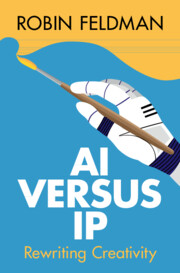Book contents
- AI versus IP
- AI versus IP
- Copyright page
- Dedication
- Contents
- Acknowledgments
- Introduction
- Part I Background on AI and IP
- 1 An Overview of Artificial Intelligence
- 2 An Overview of Intellectual Property
- Part II Hot Topics in AI and IP
- Part III The Deeper Problem for IP
- Part IV Pathways Forward
- Conclusion
- Notes
- Index
2 - An Overview of Intellectual Property
from Part I - Background on AI and IP
Published online by Cambridge University Press: 09 August 2025
- AI versus IP
- AI versus IP
- Copyright page
- Dedication
- Contents
- Acknowledgments
- Introduction
- Part I Background on AI and IP
- 1 An Overview of Artificial Intelligence
- 2 An Overview of Intellectual Property
- Part II Hot Topics in AI and IP
- Part III The Deeper Problem for IP
- Part IV Pathways Forward
- Conclusion
- Notes
- Index
Summary
This chapter examines the theoretical foundations of intellectual property law in the United States, setting the stage for understanding the challenges posed by artificial intelligence. The chapter focuses on utilitarianism as the dominant theoretical framework for US IP law, contrasting it with non-consequentialist theories. It provides a brief overview of the four major IP regimes:
Patent patent and copyright, which are explicitly grounded in the Constitution’s mandate to "promote the Progress of Science and useful Arts"; Trademark, which aims to reduce consumer search costs and ensure fair competition by protecting source identifiers; and Trade secret, which has a more convoluted history but has increasingly focused on promoting innovation and protecting confidential business information. The chapter emphasizes that US IP law prioritizes practical, societal outcomes over moral or philosophical considerations. It sets the stage for subsequent chapters that explore how AI’s emergence challenges these traditional theoretical underpinnings and the practical functioning of each IP regime.
Keywords
Information
- Type
- Chapter
- Information
- AI versus IPRewriting Creativity, pp. 31 - 40Publisher: Cambridge University PressPrint publication year: 2025
Accessibility standard: WCAG 2.0 AAA
Why this information is here
This section outlines the accessibility features of this content - including support for screen readers, full keyboard navigation and high-contrast display options. This may not be relevant for you.Accessibility Information
Content Navigation
Allows you to navigate directly to chapters, sections, or non‐text items through a linked table of contents, reducing the need for extensive scrolling.
Provides an interactive index, letting you go straight to where a term or subject appears in the text without manual searching.
Reading Order & Textual Equivalents
You will encounter all content (including footnotes, captions, etc.) in a clear, sequential flow, making it easier to follow with assistive tools like screen readers.
You get concise descriptions (for images, charts, or media clips), ensuring you do not miss crucial information when visual or audio elements are not accessible.
You get more than just short alt text: you have comprehensive text equivalents, transcripts, captions, or audio descriptions for substantial non‐text content, which is especially helpful for complex visuals or multimedia.
Visual Accessibility
You will still understand key ideas or prompts without relying solely on colour, which is especially helpful if you have colour vision deficiencies.
You benefit from high‐contrast text, which improves legibility if you have low vision or if you are reading in less‐than‐ideal lighting conditions.
